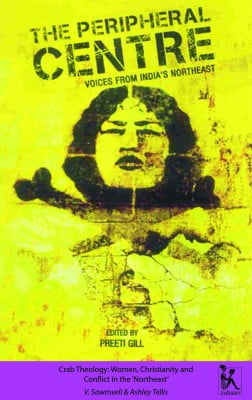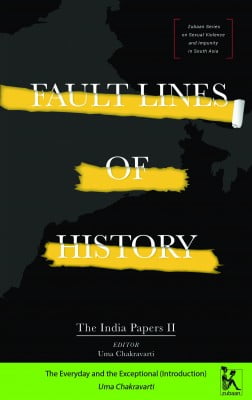No products in the cart.
Return To ShopOur e-Essays project is now LIVE! Previously-released essays are available here, and each month a new essay is available for free with any other purchase.
To be added to the mailing list, subscribe here!
The first three sets of e-Essays focused on Indian women’s movements, sexual violence and domestic space and kinship. Our fourth collection of essays is on the theme of religion and conflict. The deep-rooted association between religion and patriarchy has continued to hinder women from realising their rights. This has been further exacerbated by the politicisation of religion. Situations of conflict triggered by the desire for dominance through communal assertions place demands on women to fulfil different, seemingly contradictory, roles. The essays that we bring to you this month, on the theme of religion and conflict, explore women’s roles as victims, survivors, peacekeepers and as actors who have been denied any active participation/role in peacebuilding efforts.
_________________________________________________________________________________________
1. ‘Surviving Violence, Making Peace: Women in Communal Conflict in Mumbai‘
by Kalpana Sharma from The Violence of Development: The Politics of Identity, Gender & Social Inequalities in India, 2002
 Kalpana Sharma’s essay explores the multiple roles that women came to occupy in the riots that took place in Mumbai post the Babri Masjid demolition. As the news of this destruction – carried out on 6th December 1992 – was broadcast across the country, it triggered communal violence, resulting in two phases of riots between the Muslim and the Hindu communities. The essay looks at the people who were some of the most affected by the carnage in the city, the urban poor, and highlights how their specific spatial and economic locations had a great bearing on their lives in this period. Sharma argues in her essay that the role of the women during these riots was not defined by their gender identity alone, or even their religious affiliation, but also by their class and their location in the metropolis. 24pp.
Kalpana Sharma’s essay explores the multiple roles that women came to occupy in the riots that took place in Mumbai post the Babri Masjid demolition. As the news of this destruction – carried out on 6th December 1992 – was broadcast across the country, it triggered communal violence, resulting in two phases of riots between the Muslim and the Hindu communities. The essay looks at the people who were some of the most affected by the carnage in the city, the urban poor, and highlights how their specific spatial and economic locations had a great bearing on their lives in this period. Sharma argues in her essay that the role of the women during these riots was not defined by their gender identity alone, or even their religious affiliation, but also by their class and their location in the metropolis. 24pp.
Read more.
Kalpana Sharma is an independent journalist and author, currently a Consulting Editor with Economic & Political Weekly. She specializes in gender, developmental, and environmental issues, and has worked as a journalist for over 40 years.
_________________________________________________________________________________________
2. ‘Personal Law and Communal Identities‘
by Radha Kumar from The History of Doing, 2002
 Radha Kumar’s essay considers the history of the 1985 Shah Bano case and the feminist debates on personal law that it gave rise to. The call for a common civil code that emerged from the case was extensively critiqued by feminists, liberals and secularists, as well as Muslim religious leaders. The essay traces how the sociopolitical context led to the quick descent of the issue into communal agitation, with a demand that Muslims be exempt from Section 125 of the Criminal Procedure Code that had been cited in granting Shah Bano maintenance from her husband.
Radha Kumar’s essay considers the history of the 1985 Shah Bano case and the feminist debates on personal law that it gave rise to. The call for a common civil code that emerged from the case was extensively critiqued by feminists, liberals and secularists, as well as Muslim religious leaders. The essay traces how the sociopolitical context led to the quick descent of the issue into communal agitation, with a demand that Muslims be exempt from Section 125 of the Criminal Procedure Code that had been cited in granting Shah Bano maintenance from her husband.Kumar then traces the opposition by various women’s groups to the 1986 Bill, which was introduced in parliament with an aim to exclude divorced Muslim women from the purview of the hotly debated Section 125. She explores the ‘bitter lessons’ that Indian feminists learnt from the public and state responses to Shah Bano’s case, which then posed certain questions that would become increasingly important to feminists in the years to follow 12 pp.
Dr. Radha Kumar is the Chair of the United Nations University Council and the Director General of the think tank Delhi Policy Group. She has published various books and journal articles, and her work looks at ethnic conflicts, peacemaking and peacebuilding from a feminist perspective.
_________________________________________________________________________________________
3. ‘Crab Theology: Women, Christianity and Conflict in the ‘NorthEast”
by V Sawmveli and Ashley Tellis from The Peripheral Centre: Voices from India’s Northeast, 2010
In this essay, Sawmveli and Tellis address the role that religion plays in sociopolitical processes in Mizoram by attempting to gauge the impact that churches have had in mediating conflicts and brokering peace in the state since the 1960s. The authors also examine the role of women (and lack thereof) in peace-building processes and explores gendered critiques of the same.
Sawmveli and Tellis explain this lack of women in political processes as an affect of entrenched patriarchy and misogyny in Mizo society. They further state that since most political parties in the region are aligned with churches, patriarchy in politics overlaps with patriarchal church culture to marginalize women. However, they also discuss the many women’s organizations that have come up over the years to facilitate women’s entry into the public sphere. 13pp.
Read more.
Dr. V. Sawmveli is an Assistant Professor at the Guwahati campus of the Tata Institute of Social Sciences (TISS). Her research methodology is qualitative in nature, and focuses on the role that public, religious, and state institutions play in gendered and sexual violence in northeastern India.Dr. Ashley Tellis has held professor and lecturer positions in colleges both in India and the USA. His teaching and research interests include post colonialism, Irish literature, women’s writing, literary theory, gender studies, and poetry.
_________________________________________________________________________________________
Free in August, with the purchase of any other essay:
 ‘The Everyday and the Exceptional: Sexual Violence and Impunity in Our Times (Introduction)‘
‘The Everyday and the Exceptional: Sexual Violence and Impunity in Our Times (Introduction)‘
by Uma Chakravarti from Fault Lines of History: The India Papers II, 2016
Uma Chakravarti’s introduction to Fault Lines of History: The India Papers II uses a brief history of protest in the north-eastern states of India to illustrate the contract between the state, the army and the rule of law. Detailing the spread of AFSPA as a result and a feature of this contract, Chakravarti points to particular building blocks in the story of resistance in the area — the case of Manorama, Irom Sharmila’s hunger strike, the naked protest by imas in Manipur among others — and castigates mainstream state theorists’ neglect of AFSPA’s existence and growing application as a tool of oppressive state-building. She explains how the postcolonial state’s painting of AFSPA and militarisation, and the accompanying conflicts, as ‘states of exception’ is key to the contract, which is characterised by the tension between the rule of law and the state’s need for avowal of sovereign emergency.
This chapter also provides a valuable cross-section of the volume, summarising each author’s argument while drawing connections between them and larger themes of impunity, militarisation, conflict, revolution, state (un)accountability, ‘security’ and feminist scholarship. 34pp.
Dr. Uma Chakravarti is a feminist historian who taught at Miranda House, Delhi University. She writes on Buddhism, early Indian history, the 19th century and on contemporary issues.
_________________________________________________________________________________________
A note on pricing, frequency and format:
The e-Essays project is a new initiative from Zubaan, undertaken to make our near-fifteen years of feminist research more accessible to our readers and community. Ten new essays are released each month (on the 1st, 11th, 21st), each set curated to a theme, which subscribers receive their inbox. The essays range from just a few pages to 100-page chapters, and we have therefore created three pricing tiers: 50, 70 and 95 rupees. Responses to our test survey in March indicated that a majority of readers would be willing to pay up to Rs. 100, so we’ve kept even the longest essay under that amount. The vast majority of our readers also included PDFs in their preference of format, and we have therefore standardised all our essays in PDF files.
If you’re interested to see what’s coming next, make sure you’ve joined our emailing list, and keep your eye out for the next mailer/blog post.
Happy Reading!



